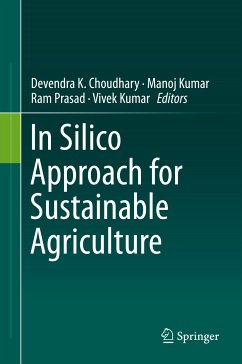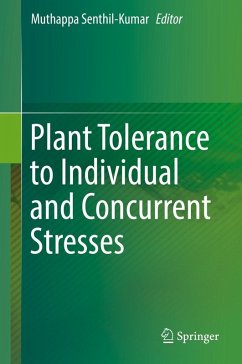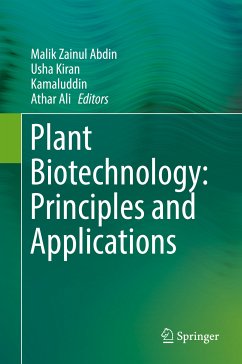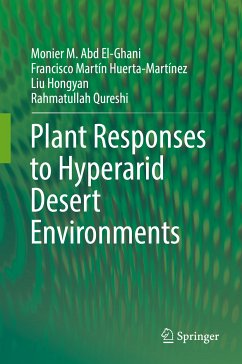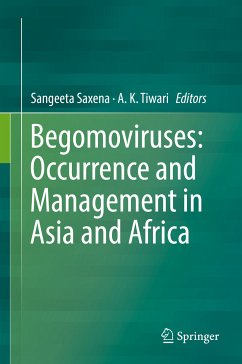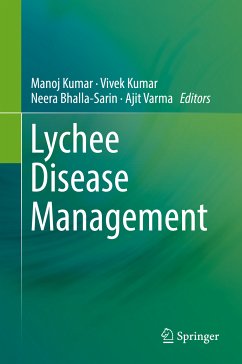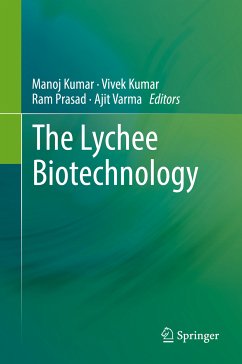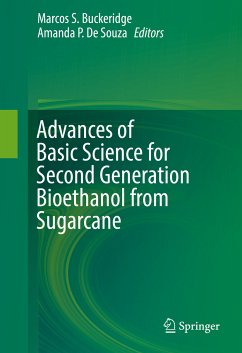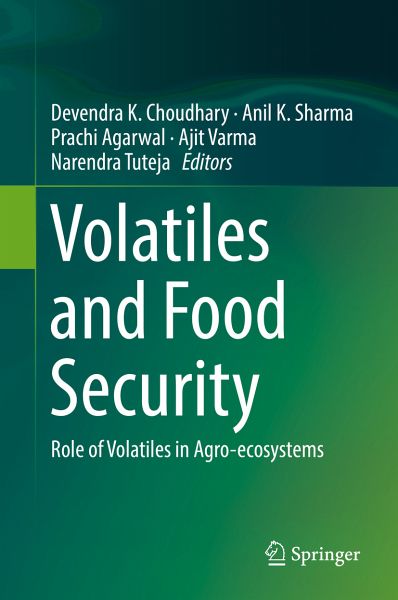
eBook, PDF
Volatiles and Food Security (eBook, PDF)
Role of Volatiles in Agro-ecosystems
Redaktion: Choudhary, Devendra K.; Tuteja, Narendra; Varma, Ajit; Agarwal, Prachi; Sharma, Anil K.

PAYBACK Punkte
56 °P sammeln!





Demonstrates the utility of volatile organic compounds in plants growth and defence
Explores innovative microbial strategies for plant productivity
Enriches the understanding of role and effect of volatile organic compounds under biotic and abiotic stress
Explores innovative microbial strategies for plant productivity
Enriches the understanding of role and effect of volatile organic compounds under biotic and abiotic stress
Dieser Download kann aus rechtlichen Gründen nur mit Rechnungsadresse in A, B, BG, CY, CZ, D, DK, EW, E, FIN, F, GR, HR, H, IRL, I, LT, L, LR, M, NL, PL, P, R, S, SLO, SK ausgeliefert werden.
Dr. Devendra K. Choudhary has fifteen years of experience in Microbial Ecology and is currently working as an Associate Professor at Amity University, Noida. Dr. Choudhary has worked on GOI sponsored major projects as Principle Investigator. As an active researcher, Dr Choudhary has published more than 50 research and review articles along with several book chapters for reputed journals and edited books. Dr Choudhary has been recognized as Member of The National Academy of Sciences (MNASc). Dr. Anil K. Sharma has completed his Ph.D. (1988) in the area mycrorrhiza and rhizosphere biology with special emphasis on basic and applied aspects in bioinoculants, composting and microalgae research. Upon completion of PhD he went to abroad for post doctoral research work as; Research Associate (11/92 - May 94) Department of Biological Sciences, Grambling State University, Lousiana, USA; Visiting Scientist (August 2003 - November 2003) Department of Botany, University of Basel, Basel, Switzerland; Visiting Scientist (September, 2013) Department of Environment Sciences, University of Helsinki, Lahti, Finland. Dr. Sharma has worked on more than 10 international and GOI sponsored major projects as Principle Investigator. He has published more than 100 research reviews paper in reputed journals with impact factor. Dr. Prachi Agarwal presently working (Since June 2012) as "Program Manager" with Biotechnology Industry Research Assistance Council, Govt of India Enterprise, Ministry of Science and Technology, New Delhi. Dr. Agarwal has pursued PhD in Energy and Environment (2004-2009), from Indian Institute of Technology - Delhi; M.Sc. in Environmental Science (2002-2004) from University of Agriculture and Technology, Pantnagar. Dr. Agarwal has published more than 20 research and review articles along with several book chapters for reputed journals and edited books. Dr. Narendra Tuteja presently acting as Director, Amity Institute of Microbial Technology (AIMT), Amity University Uttar Pradesh (AUUP), Noida. Before joining AIMT he spent years as Group Leader & Senior Scientist, International Centre for Genetic Engineering & Biotechnology (ICGEB), New Delhi. Based on his contribution to science & society he has been elected as Fellow for various science academies India/abroad; Fellow of "Third Word Academy of Sciences", Trieste, Italy (FTWAS), Fellow of "National Academy of Agricultural Sciences", New Delhi (FNAAS), Fellow of "National Environmental Science Academy", New Delhi (FNESA), Fellow of "Indian Academy of Sciences", Bangalore (FASc.), Fellow of "Indian National Science Academy", Fellow of "National Academy of Sciences", Allahabad (FNASc.). Dr. Varma currently is Distinguished Scientist & Prof. of Eminence at Amity Institute of Microbial Technology (AIMT), Amity University Uttar Pradesh (AUUP), Noida. Dr. Varma has successfully completed major projects as PI sponsored by DBT, DST, DRDO& ICAR. He has supervised more than 69 PhD students and published over 374 research articles for national and international journals of repute, as well as several major review articles and chapters in books. He has published 83 books in the area of Microbial Technology and has been the series editor for Springer-Verlag's Series on Soil Biology, and has edited fifty volumes on Soil Biology. Dr. Varma has been a member of the National Academy of Agriculture Sciences (FNAAS), International Society of Symbiosis, Boston, USA, Indian Science Congress Association, Executive Council, Amity University Uttar Pradesh.
Produktdetails
- Verlag: Springer Nature Singapore
- Seitenzahl: 373
- Erscheinungstermin: 6. Dezember 2017
- Englisch
- ISBN-13: 9789811055539
- Artikelnr.: 53058023
Für dieses Produkt wurde noch keine Bewertung abgegeben. Wir würden uns sehr freuen, wenn du die erste Bewertung schreibst!
Eine Bewertung schreiben
Eine Bewertung schreiben
Andere Kunden interessierten sich für


